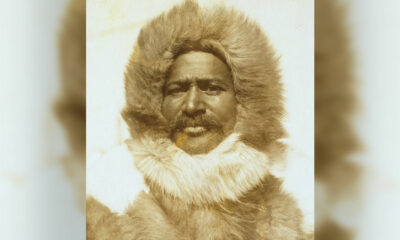Mississippi Today
Private equity-backed Texas company seeks to reopen behavioral health beds in Jackson

A private, for-profit Texas-based organization is seeking to reopen St. Dominic Memorial Hospital’s behavioral health beds in Jackson, according to state Health Department records.
Oceans Healthcare has applied to lease St. Dominic’s recently closed behavioral health beds and open its own separately licensed psychiatric hospital in Jackson. Oceans submitted its application in late October.
In the weeks following St. Dominic’s decision to shutter its 83-bed behavioral health unit in June, advocates worried that people seeking mental health care would end up in jails or without help. Shortly after the closure, two hospitals reported having full beds and were unable to accept any more psychiatric patients.
Meredith Bailess, senior director of marketing and communications at St. Dominic, referred all questions to Oceans. Oceans officials declined to answer any questions for this story.
However, a records request revealed that the company has applied to reopen 77 inpatient adult psychiatric beds, with the remaining six licensed but unused. The organization’s application to the state Health Department says that the hospital is prepared to provide the same services to the community that were previously provided by St. Dominic.
The firm’s application also includes a letter of support signed by Rep. Chris Bell and Rep. Earle Banks, two Hinds County lawmakers, as well as letters of support from St. Dominic executives, including Interim Market President Kristin Wolkart.
“It is no secret that Mississippi is facing a mental health crisis due to a lack of resources,” the representatives’ letter reads. “By approving this project, the Department of Health will enable those in my community and all central Mississippi families in crisis to obtain desperately needed healthcare closer to home.”
Eileen O’Grady with the Private Equity Stakeholder Project researches the impacts of the growing trend of private equity firms investing in health care facilities. O’Grady said while it’s generally a good thing that more behavioral health beds could open in Jackson, she is wary of any private-equity owned organization getting involved in behavioral health care.
Massachusetts-based private equity firm Webster Equity Partners bought Oceans Healthcare in 2022. Webster Equity was founded in 2003 and is active in the health care industry. The organization’s website says it targets “companies with high-impact growth strategies that deliver the highest quality care.”
As of June, the total market value of investments managed by Webster was $7.4 billion, according to the firm’s website.
Private equity firms have shown growing interest in the behavioral health industry in recent years, according to a report authored by O’Grady. But because private equity firms are focused on turning a profit, patients often suffer as a result, her report concluded.
“When I think about what they do and what the business model is, I think it can be boiled down to basically one thing: Generate the highest return possible over four to seven years,” she said. “Usually that means trying to double or triple their investment over a couple of years … That is a really short period of time to make that kind of money.”
In order to turn that kind of profit, the firms have to make big cuts. That’s especially risky for behavioral health facilities, where vulnerable people expect to receive treatment. Instead, some private equity firms have hired untrained or unlicensed staff, have failed to hire enough staff or have neglected upkeep of facilities, according to O’Grady.
Laying people off and failing to pay adequate wages can lead to persistent understaffing, which can lead to hiring people with low levels of training, O’Grady said. At behavioral health facilities, this can create dangerous situations.
She said there are some situations where firms can provide the financial backing needed to improve facilities.
But she acknowledged that’s not usually the case. If the goal is making a huge profit quickly “in an industry where margins are already very thin, it is not improbable that some combination of those things can happen.”
“Generally speaking, what we’ve seen, especially in the behavioral health space, is alarming,” O’Grady said. “It is probably not a private equity firm’s fault that these hospitals closed, and it is good that they’re reopening, but I don’t think that private equity firms are the right companies to be managing behavioral health hospitals, and if they do, then there needs to be a lot of guardrails to ensure that these facilities are not just used to sort of line the pockets of rich people.”
Oceans has been increasing its presence in Mississippi. The first Oceans hospital in the state opened in Biloxi in 2019, and its second facility opened in Tupelo at the beginning of this year. Oceans’ facilities provide adult inpatient and outpatient mental health services, according to its website.
Oceans’ application says the hospital will provide Jackson and surrounding communities with multidisciplinary psychiatric treatment for depression, bipolar disorder, schizophrenia, dementia and various other mental disorders. The application estimates that renovation of the unit will be completed at the end of March.
This article first appeared on Mississippi Today and is republished here under a Creative Commons license.
Did you miss our previous article…
https://www.biloxinewsevents.com/?p=307884
Mississippi Today
On this day in 1909, Matthew Henson reached the North Pole
April 6, 1909

Matthew Henson reached the North Pole, planting the American flag. Traveling with the Admiral Peary Expedition, Henson reportedly reached the North Pole almost 45 minutes before Peary and the rest of the men.
“As I stood there on top of the world and I thought of the hundreds of men who had lost their lives in the effort to reach it, I felt profoundly grateful that I had the honor of representing my race,” he said.
While some would later dispute whether the expedition had actually reached the North Pole, Henson’s journey seems no less amazing.
Born in Maryland to sharecropping parents who survived attacks by the KKK, he grew up working, becoming a cabin boy and sailing around the world.
After returning, he became a salesman at a clothing store in Washington, D.C., where he waited on a customer named Robert Peary. Pearywas so impressed with Henson and his tales of the sea that he hired him as his personal valet.
Henson joined Peary on a trip to Nicaragua. Impressed with Henson’s seamanship, Peary made Henson his “first man” on the expeditions that followed to the Arctic. When the expedition returned, Peary drew praise from the world while Henson’s contributions were ignored.
Over time, his work came to be recognized. In 1937, he became the first African-American life member of The Explorers Club. Seven years later, he received the Peary Polar Expedition Medal and was received at the White House by President Truman and later President Eisenhower.
“There can be no vision to the (person) the horizon of whose vision is limited by the bounds of self,” he said. “But the great things of the world, the great accomplishments of the world, have been achieved by (people with) … high ideals and … great visions. The path is not easy, the climb is rugged and hard, but the glory at the end is worthwhile.”
Henson died in 1955, and his body was re-interred with full military honors at Arlington National Cemetery. The U.S. Postal Service featured him on a stamp, and the U.S. Navy named a Pathfinder class ship after him. In 2000, the National Geographic Society awarded him the Hubbard Medal.
This article first appeared on Mississippi Today and is republished here under a Creative Commons Attribution-NoDerivatives 4.0 International License.![]()
Mississippi Today
A win for press freedom: Judge dismisses Gov. Phil Bryant’s lawsuit against Mississippi Today
Madison County Circuit Court Judge Bradley Mills dismissed former Gov. Phil Bryant’s defamation lawsuit against Mississippi Today on Friday, ending a nearly two-year case that became a beacon in the fight for American press freedom.
For the past 22 months, we’ve vigorously defended our Pulitzer Prize-winning reporting and our characterizations of Bryant’s role in the Mississippi welfare scandal. We are grateful today that the court, after careful deliberation, dismissed the case.
The reporting speaks for itself. The truth speaks for itself.
This judgment is so much more than vindication for Mississippi Today — it’s a monumental victory for every single Mississippian. Journalism is a public good that all of us deserve and need. Too seldom does our state’s power structure offer taxpayers true government accountability, and Mississippians routinely learn about the actions of their public officials only because of journalism like ours. This reality is precisely why we launched our newsroom nine years ago, and it’s why we devoted so much energy and spent hundreds of thousands of dollars defending ourselves against this lawsuit. It was an existential threat to our organization that took time and resources away from our primary responsibilities — which is often the goal of these kinds of legal actions. But our fight was never just about us; it was about preserving the public’s sacred, constitutional right to critical information that journalists provide, just as our nation’s Founding Fathers intended.
Mississippi Today remains as committed as ever to deep investigative journalism and working to provide government accountability. We will never be afraid to reveal the actions of powerful leaders, even in the face of intimidation or the threat of litigation. And we will always stand up for Mississippians who deserve to know the truth, and our journalists will continue working to catalyze justice for people in this state who are otherwise cheated, overlooked, or ignored.
We appreciate your support, and we are honored to serve you with the high quality, public service journalism you’ve come to expect from Mississippi Today.
READ MORE: Judge Bradley Mills’ order dismissing the case
READ MORE: Mississippi Today’s brief in support of motion to dismiss
This article first appeared on Mississippi Today and is republished here under a Creative Commons Attribution-NoDerivatives 4.0 International License.
Mississippi Today
Meet Willye B. White: A Mississippian we should all celebrate
In an interview years and years ago, the late Willye B. White told me in her warm, soothing Delta voice, “A dream without a plan is just a wish. As a young girl, I had a plan.”
She most definitely did have a plan. And she executed said plan, as we shall see.
And I know what many readers are thinking: “Who the heck was Willye B. White?” That, or: “Willye B. White, where have I heard that name before?”
Well, you might have driven an eight-mile, flat-as-a-pancake stretch of U.S. 49E, between Sidon and Greenwood, and seen the marker that says: “Willye B. White Memorial Highway.” Or you might have visited the Olympic Room at the Mississippi Sports Hall of Fame and seen where White was a five-time participant and two-time medalist in the Summer Olympics as a jumper and a sprinter.
If you don’t know who Willye B. White was, you should. Every Mississippian should. So pour yourself a cup of coffee or a glass of iced tea, follow along and prepare to be inspired.
Willye B. White was born on the last day of 1939 in Money, near Greenwood, and was raised by grandparents. As a child, she picked cotton to help feed her family. When she wasn’t picking cotton, she was running, really fast, and jumping, really high and really long distances.
She began competing in high school track and field meets at the age of 10. At age 11, she scored enough points in a high school meet to win the competition all by herself. At age 16, in 1956, she competed in the Summer Olympics at Melbourne, Australia.
Her plan then was simple. The Olympics, on the other side of the world, would take place in November. “I didn’t know much about the Olympics, but I knew that if I made the team and I went to the Olympics, I wouldn’t have to pick cotton that year. I was all for that.”
Just imagine. You are 16 years old, a high school sophomore, a poor Black girl. You are from Money, Mississippi, and you walk into the stadium at the Melbourne Cricket Grounds to compete before a crowd of more than 100,000 strangers nearly 10,000 miles from your home.
She competed in the long jump. She won the silver medal to become the first-ever American to win a medal in that event. And then she came home to segregated Mississippi, to little or no fanfare. This was the year after Emmett Till, a year younger than White, was brutally murdered just a short distance from where she lived.
“I used to sit in those cotton fields and watch the trains go by,” she once told an interviewer. “I knew they were going to some place different, some place into the hills and out of those cotton fields.”
Her grandfather had fought in France in World War I. “He told me about all the places he saw,” White said. “I always wanted to travel and see the places he talked about.”
Travel, she did. In the late 1950s there were two colleges that offered scholarships to young, Black female track and field athletes. One was Tuskegee in Alabama, the other was Tennessee State in Nashville. White chose Tennessee State, she said, “because it was the farthest away from those cotton fields.”
She was getting started on a track and field career that would take her, by her own count, to 150 different countries across the globe. She was the best female long jumper in the U.S. for two decades. She competed in Olympics in Melbourne, Rome, Tokyo, Mexico City and Munich. She would compete on more than 30 U.S. teams in international events. In 1999, Sports Illustrated named her one of the top 100 female athletes of the 20th century.
Chicago became White’s home for most of adulthood. This was long before Olympic athletes were rich, making millions in endorsements and appearance fees. She needed a job, so she became a nurse. Later on, she became an public health administrator as well as a coach. She created the Willye B. White Foundation to help needy children with health and after school care.
In 1982, at age 42, she returned to Mississippi to be inducted into the Mississippi Sports Hall of Fame and was welcomed back to a reception at the Governor’s Mansion by Gov. William Winter, who introduced her during induction ceremonies. Twenty-six years after she won the silver medal at Melbourne, she called being hosted and celebrated by the governor of her home state “the zenith of her career.”
Willye B. White died of pancreatic cancer in a Chicago hospital in 2007. While working on an obituary/column about her, I talked to the late, great Ralph Boston, the three-time Olympic long jump medalist from Laurel. They were Tennessee State and U.S. Olympic teammates. They shared a healthy respect from one another, and Boston clearly enjoyed talking about White.
At one point, Ralph asked me, “Did you know Willye B. had an even more famous high school classmate.”
No, I said, I did not.
“Ever heard of Morgan Freeman?” Ralph said, laughing.
Of course.
“I was with Morgan one time and I asked him if he ever ran track,” Ralph said, already chuckling about what would come next.
“Morgan said he did not run track in high school because he knew if he ran, he’d have to run against Willye B. White, and Morgan said he didn’t want to lose to a girl.”
This article first appeared on Mississippi Today and is republished here under a Creative Commons Attribution-NoDerivatives 4.0 International License.![]()
-

 Mississippi Today5 days ago
Mississippi Today5 days agoPharmacy benefit manager reform likely dead
-

 News from the South - Kentucky News Feed7 days ago
News from the South - Kentucky News Feed7 days agoTornado practically rips Bullitt County barn in half with man, several animals inside
-

 News from the South - Alabama News Feed6 days ago
News from the South - Alabama News Feed6 days ago'I think everybody's concerned': Mercedes-Benz plant eyeing impact of imported vehicle tariffs
-

 News from the South - Florida News Feed5 days ago
News from the South - Florida News Feed5 days agoFlorida special election results: GOP keeps 2 U.S. House seats in Florida
-

 News from the South - South Carolina News Feed3 days ago
News from the South - South Carolina News Feed3 days agoSouth Carolina clinic loses funding due to federal changes to DEI mandates
-

 News from the South - Alabama News Feed7 days ago
News from the South - Alabama News Feed7 days ago41st annual Bloomin Festival Arts and Crafts Fair (April 5 & 6) | March 31, 2025 | News 19 at 9 a.m.
-

 Mississippi Today5 days ago
Mississippi Today5 days agoRole reversal: Horhn celebrates commanding primary while his expected runoff challenger Mayor Lumumba’s party sours
-

 News from the South - Louisiana News Feed6 days ago
News from the South - Louisiana News Feed6 days agoMother turns son's tragedy into mental health mission














































